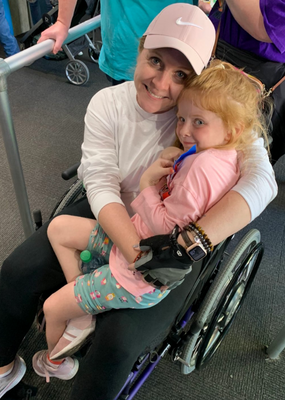I want to preface this with a disclaimer: I am not a doctor or clinical professional. I AM someone with 20+ years of experience navigating the medical world, facing a laundry list of chronic illnesses and autoimmune diseases. I am sharing what I have learned and documented lessons from trusted resources.

Growing up, my family (especially) my parents would tease, “oh, you just got the family genes.” The pain and suffering I felt when I was barely in middle school always seemed inevitable. I knew I was different, and I desperately tried to hide it.
My best friend, Tiffany, and I would go to Kings Island (amusement park) in high school, and I would wear sandals even when it was unbearably painful. I struggled to walk long distances because of the pain in my feet, legs, and back.
I hid the pain well for many years. At 5’10, and barely 140 pounds, I looked like a normal and healthy teenager.
Fast forward to today, I have a long list of diagnoses, including autoimmune diseases and chronic pain. What I’m sharing here are my diagnoses that seem to have strong roots in being caused by trauma. I don’t claim this is true for everyone; I am sharing my personal experience.
- Hashimotos
- Endometriosis
- Irritable Bowel Syndrome (IBS)
- Fibromyalgia
- Functional Neurological Disorder
- Myofascial pain syndrome
More details to come:
- GERD
- Gastritis
- Anxiety
- Depression
- PTSD
- Dermatitis
I’ll be honest, when I have to go through my list of diagnoses with new doctors, I laugh. Perhaps, it’s a coping skill because it seems unfathomable to be under 40 and have so many issues. Yet, the more I’ve learned about my mental health, the more I’ve learned about how it’s impacted my physical health.
If you have struggled with any of the abovementioned issues, I want you to know that you are not alone. If you have suffered from childhood abuse, neglect, and/or adult trauma, please keep reading and see if you might be able to understand better and heal yourself.
I’ve been able to heal trauma wounds that have directly improved these conditions. Western medicine has largely ignored the powerful mind-body connection — until recently. Eastern medicine has long been aware of the mind-body connection. In recent years, some top clinical organizations, including the Cleveland Clinic, are finally discussing the mind-body connection. Yet, it still needs to be widely accepted in the medical community.
1. Hashimotos thyroiditis
Hashimoto’s thyroiditis is an autoimmune disease that can cause your thyroid not to make enough thyroid hormone. It occurs when your body makes antibodies that attack the cells in your thyroid. Some of the symptoms include tiredness, weight gain, and muscle weakness.

In 2019, the National Library of Medicine released an extensive study showing significant associations between PTSD and hypothyroidism in women. My non-medical explanation for the correlation, your brain has been bombarded with stress hormones for so many years that, finally, your adrenals can’t take it anymore.
If you have or think you might have Hashimoto’s, I highly recommend The Hashimoto’s Protocol by Izabella Wentz. While trauma can be a considerable factor in thyroid issues, many external factors are in your control. She does a great job explaining what is overloading your body and how to heal.
I started to cut out chemicals in my diet and the products I use, which made a massive difference. As I continue to heal my trauma and take more steps in improving my routines, I’m noticing differences in how I feel. And considering that long list of ailments, every little bit makes a massive difference.
Supporting articles, research, and peer-reviewed studies:
- National Library of Medicine Research Study, Efficacy of the Autoimmune Protocol Diet as Part of a Multi-disciplinary, Supported Lifestyle Intervention for Hashimoto’s Thyroiditis
- WebMd, Childhood Abuse & Later Thyroid Problems for Women
2. Endometriosis
Endometriosis is an autoimmune disease in which cells similar to the lining of the uterus grow outside the uterus. Endometriosis often involves pelvic tissue and can envelop the ovaries and fallopian tubes. It can affect nearby organs, including the bowel and bladder. It it’s downright painful. For me, at times, the pain is at the same level as giving birth.
I always assumed this one was genetic, and yes, some women are genetically predisposed; interestingly, some studies have found a correlation between endometriosis and childhood abuse. As I’ve recovered from childhood trauma, I have realized that I have always felt trapped and constricted.
I began exploring alternative healing options when traditional methods had run out. What I found blew my mind.
According to the yogic view, your body’s 7 chakras are a convergence of energy, thoughts/feelings, and the physical body. The sacral chakra is believed to be located below the navel, where the perineum is related to expression (among other things). Let that sink in for just a moment. What might happen when the chakra related to self-expression and individuality is blocked?
As a child, I was taught that I am an extension of my caregivers. I wasn’t allowed to have individuality. Of course, my Sacral chakra would be blocked. Whether you believe in this ancient wisdom or not, it seems logical that trapped energy would cause problems.
Supporting articles research and peer-reviewed studies:
- Harvard, Link found between endometriosis and childhood abuse
- Fred Hutch Cancer Center, Endometriosis linked to childhood abuse
- National Library of Medicine, Early life abuse and risk of endometriosis
3. Irritable Bowel Syndrome (IBS)
Irritable bowel syndrome is allegedly the most common gastrointestinal diagnosis in the US. And one potential environmental contributing factor to irritable bowel syndrome is abuse in childhood. IBS is a disorder that affects the stomach and intestines. Symptoms include cramping, abdominal pain, bloating, gas, diarrhea or constipation, or both. IBS is a chronic condition that needs to manage long-term.
“Stress-induced alterations in neuro-endocrine-immune pathways acts on the gut-brain axis and microbiota-gut-brain axis, and cause symptom flare-ups or exaggeration in IBS. IBS is a stress-sensitive disorder, therefore, the treatment of IBS should focus on managing stress and stress-induced responses.”
National Library of Medicine
If you’ve been diagnosed with IBS, you likely heard that it was caused by stress, and yes, this is true. It likely began in childhood. And the issue is compounded because you didn’t learn the proper coping skills as a child.
Unfortunately, Western medicine focuses on the symptoms, not the issue’s root. Stress creates a cycle of gut pain, and taking medicine to cover up the gut pain is not helping anything.
Supporting articles research and peer-reviewed studies:
- National Library of Medicine, Impact of psychological stress on irritable bowel syndrome
- Forbes, Trauma and the Gut: More Clues about IBS
- LiveScience, Psychological Trauma Linked to Bowel Disorder
5. Fibromyalgia
Fibromyalgia is a chronic disorder that causes pain throughout the body. It also causes fatigue and trouble sleeping. Scientists do not fully understand what causes it, but people with the disorder have a heightened pain sensitivity. I felt so much shame around this diagnosis and didn’t share it for years. Now that I understand better how my trauma has impacted my body, I have no shame.
The International Society for Traumatic Stress released a study in 2020 that indicated Fibromyalgia patients reported a higher percentage of trauma and higher scores in PTSD symptoms than healthy participants. The mechanisms by which trauma leads to Fibromyalgia are not entirely clear.
“Traumatic experiences in early life may predispose to FM by excessively activating stress responses during a critical period of development, thus altering normal development and reactions to stress and painful stimuli through hyperalgesic priming. As the resulting pain is a stressor, it may lead to a positive feedback loop, which serves to increase anxiety levels and further impact on stress regulation.”
National Library of Medicine
Supporting articles research and peer-reviewed studies:
- International Society for Traumatic Stress, Trauma in fibromyalgia and clinical manifestations: The role of anxiety in the relationship between post-traumatic stress symptoms and fibromyalgia status
- National Library of Medicine, Early Life Adversity as a Risk Factor for Fibromyalgia in Later Life
- EMJ Innovations, Peer-Reviewed Article, Central Processes Underlying Fibromyalgia
- National Library of Medicine, Psychiatric comorbidity and childhood trauma in fibromyalgia syndrome
6. Functional Neurological Disorder
Functional neurological disorder (FND) describes a problem with how the brain receives and sends information to the rest of the body. Think of your brain as a computer. In someone with FND, there’s no damage to the hardware, but there’s a glitch in the software. The problems in FND are going on in a level of the brain that you cannot control. Symptoms include arm and leg weakness, non-epileptic seizures, fatigue, loss of balance, speech problems, numbness, and more.

I was diagnosed with FND in October of 2021, after a year of being largely brushed off by the medical community. I am forever grateful to the Cleveland Clinic Neurological restoration team that helped me get pieces of my life back. This diagnosis led me down the rabbit hole to understand how my mental health had impacted my physical health. Before this diagnosis, I assumed I had terrible luck and bad genes. Well, the bigger picture was way more complex and sadder than I could ever anticipate.
In 2021, I felt good about life. My mental health was better than it had ever been. So when I learned that FND was strongly correlated with trauma, I was angry and downright in denial. I had worked so hard to heal I felt there was no way possible this was related to my mental health.
When I started diving back into therapy (to cope with my new disability), I was forced to come to terms with the truth finally. Childhood abuse was at the core of most of my issues, including FND.
“The exact cause of functional neurologic disorder is unknown. Theories regarding what happens in the brain to result in symptoms are complex and involve multiple mechanisms that may differ, depending on the type of functional neurological symptoms.”
Mayo Clinic
Supporting articles research and peer-reviewed studies:
- National Library of Medicine, A guide to functional disease for a trauma conscious generation
- Sheffield Teaching Hospitals, What causes functional neurological disorders?
- Academy of Consultation-Liaison Psychiatry, Post-traumatic Stress Disorder Symptom Substitution as a Cause of Functional Neurological Disorder
7. Myofascial pain syndrome
Myofascial pain syndrome is another chronic pain disorder. In this condition, putting pressure on sensitive points in your muscles (trigger points) causes immense pain. Different factors can contribute to this syndrome, but for me, it’s caused by continual muscle stress.
When you suffer from anxiety, you may notice that you tense your body. Personally, I tense my neck, back, and pelvic floor muscles. Long story short, prolonged tensing creates a buildup of lactic acid. The muscles don’t release long enough for the muscles to restore properly.
Supporting articles research and peer-reviewed studies:
- National Library of Medicine, Relationship between traumatic events in childhood and chronic pain
TO BE CONTINUED…
I have more to share, but I want to publish this piece for now. I will continue expanding because we’ve barely scratched the surface of this topic!
More details to come:
- GERD
- Gastritis
- Anxiety
- Depression
- PTSD
- Dermatitis
Additional suggested reading
Functional medicine and healing autoimmune disease supporting articles, research, and peer-reviewed
More attention and research are needed, yet trends are showing a possibility of reversing autoimmune disorders through functional medicine. I will continue to provide research as it becomes available. Just like everything else in the medical community, it’s worth keeping an open mind that perhaps a better solution is yet to be discovered.
- The Institute for Functional Medicine, Autoimmune Disease: Treatments and Outcomes
- Dr. Christine Maren, The Functional Medicine Solution for Autoimmune Disease
- The Institute for Functional Medicine, Fight Inflammation and Stabilize Mast Cells Naturally
- Cleveland Clinic Functional Medicine Department
- Innovative Health Clinic, Reversing Autoimmune Disorders by Treating the Root Cause
More relevant articles, research, and peer-supported reviews
- Harvard Health Publishing, Chronic pain and childhood trauma
- CDC, Epigenetics and gene expression
- Bio Med Central, The emerging role of epigenetics in human autoimmune disorders
- Frontiers in Immunology, Role of Epigenetics in Autoimmune/Inflammatory Disease
- National Library of Medicine, The genetics and epigenetics of autoimmune diseases
- Cellular & Molecular Immunology, The epigenetics of autoimmunity
Epigenetic treatments are already being used in oncology and may soon prove beneficial in autoimmune diseases.














